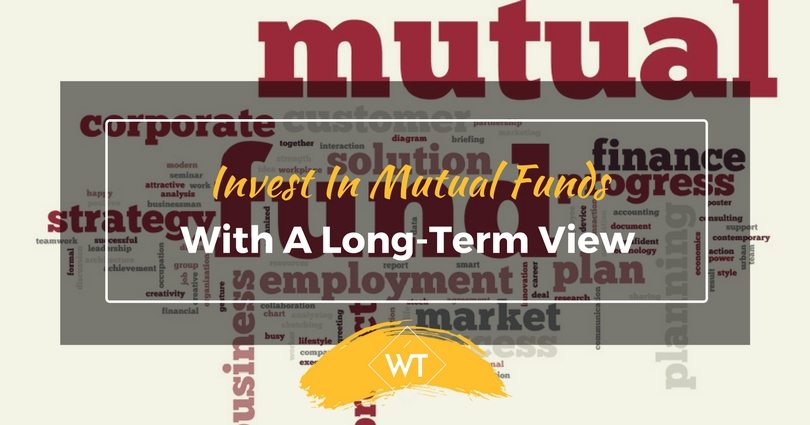Invest in Mutual Funds with a Long-Term View

Mutual Funds and stocks are similar in the nature that their prices are market driven and when you invest there is no guarantee about returns. However the approach to monitoring their performance should also be different. When you invest in mutual funds, you are investing with an underlined assumption that there are professionals managing your money so you do not have to monitor it at a regular basis unlike the equity market.
There are professionals taking care of your money, but having said that, you should make your choice well and try and desist from the cliché of exiting at a high. When you invest in mutual funds it pays to have a long term view; let’s see why?
Though technically a period more than 3 to 5 years is considered to be long term; I am referring to period of 10 years or more for wealth creation when it comes to mutual funds.
When you invest in mutual funds with a long term view, it is important that you choose your fund well and even if you are not required to measure the fund’s returns very frequently, you should review its performance periodically.
Stay Invested
It is important to have a realistic approach about the fund that you choose. A mutual fund must be chosen with careful thought and analysis but once you have made a choice, it is a good idea to keep your faith.
If the fund stops performing well after giving good or decent returns (for some time) you should not rush to exit from it. Duration of market cycles unlike before have shortened and they can be very volatile. So investors often watch their funds very carefully and might not be able to resist the temptation of switching to another option the moment the fund starts showing the downward trend.
Here it is important to remember that a good fund manager’s job is not to do well when the markets are up but to make sure that the losses are not too high when the markets are bad. All mutual funds are expected to go through bad patches so keep that in mind the next time you see bad quarter results for your mutual funds.
When choosing a fund keep the following in mind:
- Type of Fund: There are some funds which are typically suited for the short-term (money market funds) so when choosing the scheme keep that in mind. Equity funds (growth) are especially more suited for a long term period of 5-10 years. Sectoral funds should be avoided when investing for a long term. In equity also try to get the mix right; include large cap, mid-cap and small-cap in your portfolio. Debt funds should be evaluated over a shorter period.
- Fund Details: No investment should be made without finding out about basic details about who is the promoter of the scheme; where are the investments going to be made, what is the time-horizon or scheme target and so on.
- Past Performance: Unless it is a NFO (New Fund Offer), in which case the company details/fund basics become more important, the past performance of fund can give important clues about the fund’s management and stability. You can compare its performance with a benchmark index or use other tools to evaluate its performance. It is important to look at the returns in a falling market to see how safe would your capital be when compared to the other funds or the market as a whole.
| Top 5 Performers Based on 5 Year Returns (Equity Open Ended) | Return % | Top 5 Performers Based on 1 YeaReturns (Equity Open Ended) | Return % |
| ICICI Prudential Technology Reg | 39.79 | ICICI Prudential Technology Direct | 57.18 |
| Reliance Pharma | 35.74 | ICICI Prudential Technology Reg | 56.13 |
| SBIIT | 35.56 | MotilalOswal Most Shares NASDAQ-100 ETF | 53.33 |
| SBI Pharma | 34.17 | FT India Feeder US Opportunities Direct | 51.27 |
| SBI FMCG | 33.80 | FT India Feeder US Opportunities | 49.59 |
The above table (as of Oct 2014) shows that it is not necessary that the funds that perform well in one year will give a consistent and high performance throughout. So it is better to look at a 3-5 year period to get an accurate picture. Also consider the difference of the level of returns over one year and five year period.
Reinvest
Another factor to be mindful of when you invest in mutual funds with a long-term plan, is re-investing the money back into the fund. Most funds offer the dividend and the growth plan. In the dividend plan the profits are paid out to the investor in the form of dividend which is tax-free in the hands of the investor.
Though this sounds very lucrative but a growth plan in which the profits are recycled back into the fund is definitely likely to benefit the investors as the returns are put back into these high return funds. The magic of compounding will help in wealth creation over a long term.
Keeping the long term view in mind, many companies have come out with specific goal based schemes that cater to specific goals of the investor, which are typically long term – like retirement, children’s marriage/education etc. If you have a specific goal, then you could definitely look at one of these funds for investment and stay invested in it.









Leave a Reply